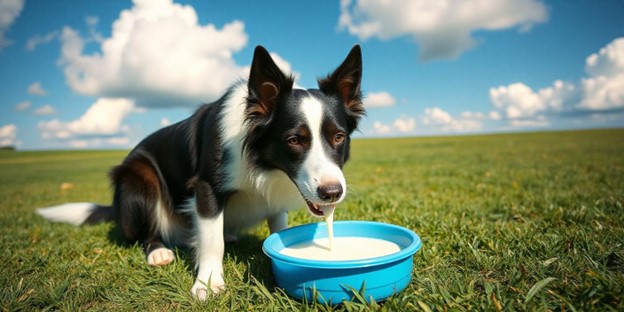Ever wondered why goat milk is becoming the most popular superfood for dogs? It is not just a fad, but goat milk contains essential nutrients and probiotics that are good for your dog’s health. In this post, we will go over what makes goat milk so special, take a look at some of its many benefits, discuss any potential side effects it might have and provide you with some tips on how to integrate it into your dog’s meals.
A Brief Introduction to Goat Milk for Dogs
Goat milk isn’t just an alternative that provides nutrition to humans; it also has numerous advantages for dogs. Unlike cow’s milk which can be hard on the digestive system of a dog, goat milk is easier on digestion and has many health benefits. Whether you offer it raw, fermented or as part of homemade dog treats, there are many ways to include goat’s milk in canine diets.
Health Benefits of Goat Milk for Dogs
1. Digestive Health
Goat milk is full of probiotics, the friendly bacteria that keep your dog’s gut healthy. These probiotics help with digestion, reduce bloating, and ease gastrointestinal discomfort. If your dog has a sensitive stomach, goat milk can be a gentle and nourishing option.
2. Natural Thirst Quenching
Goat milk can be a great way to keep your dog hydrated, especially if he has no interest in water. It is tastier than plain water and will help ensure that the animal remains hydrated, especially during times of extreme heat or after exercising.
3. Allergy Treatments
A lot of dogs are allergic to cow milk proteins; however, they can safely consume goat’s milk. It contains smaller globules of fat as well as different proteins which make it a lesser allergenic substance. This makes it suitable for dogs with food allergies and other skin conditions.
4. Skin and Fur Care
The fats which are healthy and vitamins contained in Goat Milk may result in shinier coats and healthier skin: Omega-3 and omega-6 fatty acids found in goat milk assist with reducing inflammation thus preventing dry and itchy skin that could lead to shiny fur.
5. A Boost in Immunity
Goat’s milk contains minerals like vitamins that strengthen the immune system of the dog. The probiotics present provide the right balance for bacteria inside the gut aid defence against diseases.
6. Universal Use
One good thing about goat’s milk is its use across diverse applications You can give it as treats, mix it with kibble foods, use it for homemade pet meals but sometimes you might freeze it into ice cubes for cool treats.
7. Nutrient-Richness
It is important to note that goat’s milk is full of nutrients like calcium, potassium and magnesium required by strong bones and muscles. It also contains Vitamin A, D & B6 essential for your dog’s well-being overall.
8. Probiotics
Goat’s milk has high probiotic content which helps maintain a healthy digestive system. These help digestion besides aiding nutrient absorption thereby lowering risks of diarrhea while maintaining a balanced gut flora.
9. Anti-inflammatory Effect
Natural anti-inflammatory properties inherent to Goat Milk are able to decrease inflammation within your beloved friend’s body which is especially important for dogs suffering from arthritis and allergies. It also promotes joint health and mobility.
10. Aid Growth & Development
For puppies and young dogs, goat milk provides essential nutrients that support growth and development. This aids digestion of proteins as well as fats in goat milk which are usually easily assimilated by growing puppies for strong bones, muscles, etc.
Potential Drawbacks Of Goat Milk For Dogs could be :
While there are many benefits of giving your dog goat milk, it is important to remember about the possible side effects of quick introduction or high dosage.

1. Lactose Intolerance
The presence of lactose in goat’s milk that although significantly lower than cow’s milk can still cause problems with digestion among lactose-intolerant dogs leading to symptoms such as diarrhea, gas, or bloating.
2. Allergic Reactions
However, some dogs may still be allergic even to goat’s milk though it is generally safer than cow’s one.If you notice any signs like itching, swelling or upset stomachs after feeding the dog with goat milk then it is advisable to stop feeding this pet and refer to a vet immediately.
3. Weight Gain
Feeding too much would lead to weight gain mainly due to its high calorie content especially on less active or older pets. Nevertheless, you should monitor their portions sizes and adjust his overall calorie intake accordingly if necessary.
4. Imbalanced Nutrients
Over-reliance on goat’s milk can disrupt the balance of nutrients within the dog diet. Rather than being one’s main food source, goat milk should be taken as a supplement.
5. Problems of Digestive System
Introduction of goat milk to the dog’s diet too soon can cause digestive problems such as diarrhea or vomiting and calming down is essential for allowing your pet’s gastrointestinal system to adapt to it.
6. Pancreatitis Risk
Goat milk has high fat content which can trigger pancreatitis if given to dogs with this disease in their history. If your dog has ever had pancreatitis, it is recommended that you consult a vet before adding goat milk to its diet plan.
7. Increased Thirst or Urination
Increased Thirst or Urination After drinking goat milk, some dogs may become thirstier or urinate more often especially if it is new to them so you will need to monitor how much water your pet drinks and its toilet behavior when you introduce some amount of goat milk into its feedings.
8. Spoilage Potential
In order not to spoil quickly after opening, goat milk needs refrigeration and always check if it is okay before giving out any portion intended for the dog
Comparing Goat Milk against Other Milks
Anytime we compare goat against other types like cow almond soy etc., there are many times when this particular type stands out as having better digestibility and nutritional advantages.

Goat Milk vs. Cow’s Milk: Smaller fat globules in the former make it easier on dogs’ stomachs unlike those present in cow’s; hence, contains more nutrition and fewer allergens (Godfrey et al., 1995). Plus, goats’ have smaller fats balls while they contain higher amounts of nutrients but less allergen compared with cows’ hence easily digested (Lopez et al 1991).
Goat Milk vs. Almond Milk: Almond milk is lactose-free, but it doesn’t offer the same nutritional benefits as goat milk. Also, some almond milk products contain additives or sweeteners that can be harmful to dogs.
Goat Milk vs. Soy Milk: Soy milk is another lactose-free option, but it’s harder to digest and can cause allergic reactions in some dogs. Goat milk’s natural probiotics and anti-inflammatory properties make it a better choice.
Nutrition Information of Goat Milk
Goat milk is nutrient-rich, offering essential vitamins and minerals that contribute to your dog’s overall health.
Nutritional Profile (per cup of goat milk):
- Calories: Around 170
- Protein: 9 grams
- Fat: 10 grams
- Calcium: 330 mg (33% DV)
- Magnesium: 34 mg (8% DV)
- Potassium: 498 mg (14% DV)
- Vitamin A: 483 IU (10% DV)
- Vitamin D: 29.4 IU (7% DV)
Recipes and Feeding Tips
Here are some easy ways to add goat milk to your dog’s diet:

1. Frozen Goat Milk Treats:
- Ingredients: 1 cup goat milk, 1 mashed banana, 1 tablespoon peanut butter.
- Instructions: Blend the ingredients, pour into ice cube trays, and freeze. These treats are perfect for hot days.
2. Goat Milk and Pumpkin Mix:
- Ingredients: 1 cup goat milk, 1/2 cup canned pumpkin.
- Instructions: Mix together and use it as a topper for your dog’s kibble to boost flavor and nutrition.
3. Goat Milk and Bone Broth Combo:
- Ingredients: 1/2 cup goat milk, 1/2 cup bone broth.
- Instructions: Mix and serve as a warm, comforting drink during colder months.
Feeding Tips:
- Start Slow: Introduce goat milk gradually, starting with a small amount and increasing as your dog gets used to it.
- Watch for Reactions: Monitor your dog for any signs of digestive upset or allergic reactions.
- Consult Your Vet: Before adding goat milk to your dog’s diet, especially if they have pre-existing health conditions, it’s best to check with your vet.
Conclusion
In the main part, it is usually safe to make a gradual entry while minding about possible complications. It might be good to look for goat milk if you intend to improve digestion of your dog, boost its immunity or simply give it a nutritious treat. Always consult with your vet to make sure it’s the right fit for your furry friend.





Be First to Comment